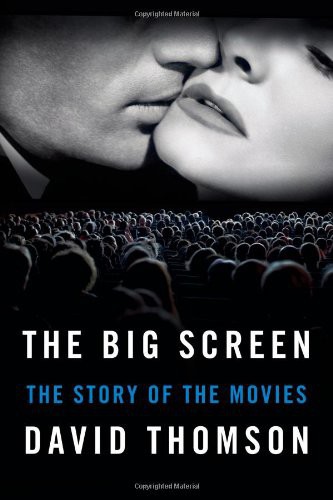
The Big Screen
The Story of the Movies
کتاب های مرتبط
- اطلاعات
- نقد و بررسی
- دیدگاه کاربران
نقد و بررسی

Starred review from July 30, 2012
From 19th-century photographer Eadweard Muybridge’s motion studies to the latest cable-TV and video game offerings, this fascinating history of movies and their spinoffs celebrates and indicts the flickering image that beguiles. Film critic and historian Thomson (The Whole Equation: A History of Hollywood) concentrates on American movies, but takes excursions to other national cinemas and stops in occasionally on I Love Lucy and other gems of the small screen. His is a loose-limbed, conversational narrative, moving fitfully through time, dawdling over directors and films that interest him, shamelessly ogling every starlet that strikes his fancy, spouting provocative opinions—thumbs up to Adam Sandler, thumbs down to Lars von Trier and his “insufferable” Dogme-tisms—at every turn, ruminating throughout on the ravishing, corrupting essence of light playing across empty screens. Crackling with ideas and vivid impressionisms (get a load of Lauren Bacall, “holding up a doorway in case it faints”)—Thomson’s stylish prose, simultaneously erudite and entertaining, captivates as it informs—and if things get overlooked in his idiosyncratic treatment (where’s John Wayne?) one notices mainly because one is dying to hear what he thinks about them. Buffs and casual fans alike will enjoy this extra-large serving of popcorn for thought. Photos.

Starred review from November 1, 2012
Thomson (The Moment of Psycho: How Alfred Hitchcock Taught America to Love Murder, 2009, etc.) brings his encyclopedic knowledge of film and idiosyncratic, allusive style to bear on this ambitious consideration of the history of motion pictures and their effect on the audience. The author goes beyond mere survey and analysis to question what movies mean to us and how they have shaped our perceptions and beliefs. Thomson chronicles the development of movies from Eadweard Muybridge's 19th-century photographic experiments to the phenomenon of Internet pornography. Along the way, he explicates the excitement and politically fraught evolution of Soviet cinema, the provocations of the European New Wave, the allure of film noir and the world-shaking product of Hollywood, but the author makes no attempt to give a comprehensive or strictly linear history of the medium. Thomson is more interested in making striking connections, looking deeply at particular films, such as Brief Encounter (a surprising subject for such intense scrutiny and indicative of Thomson's iconoclastic bent) or the TV landmark I Love Lucy, to pursue the central question of his history: What does life in front of screens do to us? Thomson's approach is lyrical and questing rather than academic; the book is accessible to anyone with more than a passing interest in the subject, written in a distinctive voice, learned and authoritative without pedantic dryness and touched with wonder and trepidation at the primal power of the image. Readers familiar with the author's Biographical Dictionary of Film will be happy to note that Thomson's beguiling knack for capturing the essences of our movie icons in poetic or provocative asides has not diminished, and the scholarship on display is first-rate. However, the heart of this unique overview is the author's ambivalence about the power we grant those shadows on the wall. A profound and richly satisfying reckoning with the movies and what they mean.
COPYRIGHT(2012) Kirkus Reviews, ALL RIGHTS RESERVED.

October 15, 2012
Film guru Thomson (The New Biographical Dictionary of Film) presents a freewheeling historical and sociopolitical treatment of film that deals with screens big and small worldwide. Thomson discusses the global influence of film images (from Biograph Studios to the Zapruder film to Johnny Carson); subject matter (from film noir to politics to porn); significant films, directors, and genres; how sexual relationships have shaped the film community; academia's resistance to film studies; and his own speculations about the future of the movies. Thomson blends fact with incisively witty commentary. The high quality of this sophisticated, worldly-wise overview of the industry, art, and influence of film outweighs its rough organization, awkward (or nonexistent) reintroduction of subjects, and generally kaleidoscopic (and thus disorienting) format. VERDICT This is an essential title for readers who know and love film and for those who wish to know more; it functions both as a great reference and a great read. Chronology and linearity be gone, this thing sparkles.--Ann Fey, Rockland Community Coll., SUNY
Copyright 2012 Library Journal, LLC Used with permission.

Starred review from September 15, 2012
Veteran essayist Thomson's thoughtful new book is not just the story of traditional cinema; the screen of the title refers not only to the silver screen of the movies, but also to television and beyond. Early on, he draws a fascinating parallel between the viewing experience of Edison's nickelodeon, a single person watching a short film loop through a viewfinder, to the way we now watch YouTube-length clips on our computer screens, whether tablet- or smartphone-size. But does the vacuum of watching alone merely stimulate our proclivity for fantasy and illusion? How has 100 years of watching movies affected our ability to handle realities outside the screen? Every page is studded with provocative questions meant to goad readers into rethinking common assumptions. For much of the book, he co-opts the approach of his earlier tome, The New Biographical Dictionary of Film (2010), sketching thumbnail portraits of dozens of historical figures: Eadward Muybridge, John Ford, Ingrid Bergman, Akira Kurosawa, Lucille Ball, George Lucas, Quentin Tarantino, and others. The way he strings these cameos together thematically rather than chronologically will prove maddening to anyone wanting a straightforward history. But if the most important quality of a book about the movies is that it triggers a craving to reexamine the movies themselves, then Thomson's book is a spectacular success.(Reprinted with permission of Booklist, copyright 2012, American Library Association.)

























دیدگاه کاربران